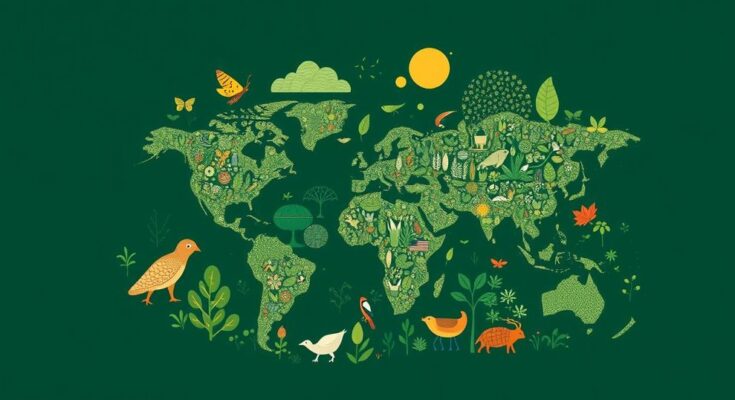The 16th Conference of the Parties (COP16) to the Convention on Biological Diversity, taking place from October 21 to November 1, 2024, in Cali, Colombia, will convene global leaders and environmental experts to address the pressing crises of biodiversity loss and climate change. The International Fund for Animal Welfare (IFAW) is advocating for an integrated approach to these issues, emphasizing the critical need to protect marine environments and align strategies to ensure a sustainable future.
Leaders and environmental specialists are set to convene for the 16th Conference of the Parties (COP16) to the Convention on Biological Diversity (CBD) from October 21 to November 1, 2024, in Cali, Colombia. The International Fund for Animal Welfare (IFAW) has called for a concerted international effort to address the urgent challenges of biodiversity loss and climate change, which are intricately linked. Matt Collis, Senior Director of Policy at IFAW, emphasized the necessity of integrated initiatives, stating, “We can’t solve either the climate crisis or biodiversity loss without addressing the other.” He highlighted that COP16 represents a critical juncture that could shape future national and international strategies for environmental protection. As COP16 is the first among the interrelated Rio Convention meetings scheduled for 2024, it has the potential to establish a cooperative framework for the forthcoming UN Framework Convention on Climate Change (UNFCCC) COP30, where nations will be required to revise their climate action plans. Moreover, the recent COP28 Joint Statement on Climate, Nature, and People advocates for a cohesive strategy, and IFAW has urged that the commitments made in this document should be reflected in the outcomes of COP16, particularly in the high-level discussions and the Cali Declaration. The preservation of marine and coastal biodiversity is particularly critical. Marine ecosystems are essential not only for sustaining diverse wildlife but also for regulating the Earth’s climate by sequestering carbon and stabilizing weather patterns. Collis stated, “Healthy oceans are the foundation of a healthy planet. They absorb carbon, mitigate climate impacts, and support rich biodiversity.” He urged that the protection of these ecosystems should be prioritized at COP16 to ensure their continued provision of critical ecological services amid escalating climate challenges. Collis further remarked, “Time is running out to tackle the intertwined crises of biodiversity loss and climate change, but COP16 offers hope. By ensuring that biodiversity and climate efforts are aligned at every level, we can make meaningful progress. The future of our planet depends on it.” In conjunction with the conference, IFAW will host a side event entitled “Leveraging wildlife conservation and rewilding to supercharge climate mitigation and adaptation” on October 24 at 4:30 PM COT, focusing on the important role wildlife plays in addressing climate change, along with the launching of new guidelines to assist governments in integrating wildlife conservation within their climate strategies. More information on this event can be accessed at https://www.cbd.int/side-events/5723.
The upcoming COP16 aims to address two critical global crises: the loss of biodiversity and climate change, which are deeply interrelated. Leaders coming together at this event are expected to create strategies that prioritize the intertwined nature of these challenges. As the first Rio Convention COP in 2024, it is poised to set the tone for international dialogue about environmental sustainability. The focus on marine ecosystems highlights their dual role in supporting rich biodiversity and mitigating climate change, emphasizing the urgent need for integrated approaches to environmental conservation.
In conclusion, the 16th Conference of the Parties to the Convention on Biological Diversity presents a pivotal opportunity for global leaders to forge a united front against climate change and biodiversity loss. Through the commitment to align efforts and prioritize the protection of vital ecosystems, particularly marine environments, meaningful progress can be achieved to safeguard the future of the planet. Stakeholders are urged to engage with and contribute to the outcomes of this significant event.
Original Source: www.ifaw.org




